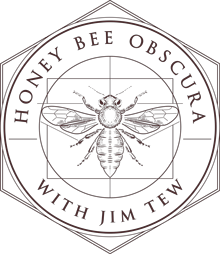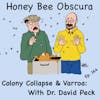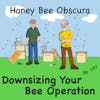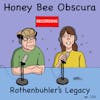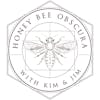Hive Inspections: When, Why and How Often (160)

Hive inspections are essential in the beekeeping, serving as the cornerstone for effective colony management. Through these inspections, beekeepers gain crucial insights that guide their decisions for immediate and long-term hive care. In this...
Hive inspections are essential in the beekeeping, serving as the cornerstone for effective colony management. Through these inspections, beekeepers gain crucial insights that guide their decisions for immediate and long-term hive care. In this episode, Jim is joined by Anne Frey, an EAS Master Beekeeper from Betterbee, to delve into the intricacies of hive inspections.
Anne shares her expertise on the timing, frequency, and methods of conducting thorough hive inspections. She emphasizes the importance of observing colony behavior, brood patterns, and the health of the queen. These observations are vital for assessing the colony's strength, detecting potential issues like disease or pests, and planning for interventions like feeding or splitting hives.
Listeners will gain a deeper understanding of the nuances involved in hive inspections, including how seasonal changes affect the hive and the best practices for minimizing stress on the bees during inspections. This episode is not just about the mechanics of checking frames but understanding the language of bees and making informed decisions that ensure the health and productivity of the hive.
Join us as we explore the critical role of hive inspections in successful beekeeping. Whether you're a novice or an experienced beekeeper, this conversation with Anne Frey is bound to enrich your beekeeping practice.
______________________
Thanks to Betterbee for sponsoring today's episode. Betterbee’s mission is to support every beekeeper with excellent customer service, continued education and quality equipment. From their colorful and informative catalog to their support of beekeeper educational activities, including this podcast series, Betterbee truly is Beekeepers Serving Beekeepers. See for yourself at www.betterbee.com
______________________
Honey Bee Obscura is brought to you by Growing Planet Media, LLC, the home of Beekeeping Today Podcast.
Music: Heart & Soul by Gyom, All We Know by Midway Music; Christmas Avenue by Immersive Music; original guitar music by Jeffrey Ott
Cartoons by: John Martin (Beezwax Comics)
Copyright © 2024 by Growing Planet Media, LLC

Episode 160 – Hive Inspections: When, Why and How Often
Jim Tew: Beekeepers, it's time for another weekly episode of Honey Bee Obscura, where we talk about all things beekeeping. What's on our mind today is honey bee hive inspections. How, when, why, how often, or how few times should you have a look. I'm with Anne Frey.
Anne, what do you think? Are you just a chronic hive inspector, or do you pace yourself more?
Anne Frey: I've learned to pace myself, but when I started, it was hard to not go out there every day.
Jim: I know that feeling very well. I know it very well. Hi, I'm Jim Tew.
Anne: I'm Anne Frey from Betterbee.
Jim: If you don't mind, listeners, we'd like to spend a few minutes on exactly when and why and how often, if even you should, inspect your hives.
Introduction: Welcome to Honey Bee Obscura, brought to you by Growing Planet Media, the producers of The Beekeeping Today podcast. Join Jim Tew, your guide through the complexities, the beauty, the fun, and the challenges of managing honey bees. Jim hosts fun and interesting guests who take a deep dive into the intricate world of honey bees. Whether you're a seasoned beekeeper or just getting started, get ready for some plain talk that'll delve into all things honey bees.
Jim: Anne, thanks for being back again and for agreeing to talk about this topic. I wonder if I could say this and either get support or not support from you, but when I was a young beekeeper, new at this, I just couldn't stay out of the bees. They really never had any private time at all. I just loved it. As I got older and everything changed, and you'd seen it before, we've had some other segments on repetitive beekeeping, it changed. I began to only open the colony if there was a specific reason for it, but never just a whimsical reason, the way I used to as a newer beekeeper. Either support that or shoot it down.
Anne: Totally. On the other hand, we like to encourage beginners, I don't know if I'd call it whimsical, but look into that hive as often as they want to and get themselves used to the muscle memory and the normal look of things. It changes from actually teaching a person something when they're a beginner to just being invasive if you do it year after year, every single day, but there's a purpose and a time for it.
Jim: Nobody said this except for me. It was just strictly a Jim Tew-ism, but I've said to many audiences many times, I'll give you five years, and that should be two more than you need, but I'll give you five years. Go open your colony, paw through them, look at them, get to know them, develop your confidence and your demeanor about it. After five years, you really ought to know what you're doing now. You shouldn't have to be out there so often just opening the colony because it's a nice Friday afternoon and you've got nothing else to do. There needs to be a reason.
Anne: [laughs] Yes, there should be a reason. No need to go in there and examine all 20 brood frames just because. Sometimes you can tell after you've had those five years if there is a reason just by looking at the entrance to every hive, and then you focus in on the ones that look like they don't have enough bees at the entrance, or some strange garbage has been dropped out the door and corpses of bees or some frass, and then which one to pay attention to. You don't have to hunt through every frame in every hive to learn what's going on.
Jim: I agree with you, but there's a thing-
Anne: A thing.
Jim: -that I feel I need a bee fix sometimes.
Anne: I know what's good for that.
Jim: Just like I want a particular food or whatever. Even though I'm admonishing people only open and look at a hive if it absolutely needs to be, since I'm a hobby bee enthusiast of sorts and I'm not doing this for economic gain, at some point I just want to see. I want to smell the bees. I want to see the fresh nectar coming in. I just want to see it, but I don't have to see it as often as I used to. There is that. Look at the hive entrance. I was glad to hear you say that because now I don't have to feel quite as lazy for not lighting a smoker, suiting up, taking off those honey supers, and then digging down to some brood frames. I can just stand there and look at the entrance and say, okay, that's good enough. I'm going to move on now. Some inspections are just because I want to. Other inspections are seasonal. I'm looking to be sure that I've got a good queen pattern and that she was accepted after I installed her three or four weeks ago. Sometimes there's very specific reasons like that, but they are always beekeeper determined.
Anne: You might be checking to see if all of those new frames of foundation are getting drawn into good comb, or if it's time to put on another super because it only had one. There are specific reasons to do specific checks.
Jim: When I used to open them after I was beyond my five-year honeymoon period, I did find myself not looking at every brood frame. You could look at 2 to 3 frames of the 10 maybe frames of brood that were there and 2 deeps, and that's enough of a review to tell the status of that colony. You don't have to pull every frame out. I don't know if this is exactly required or not, but I was always careful to put the frames back in the way the bees had it, unless there was a distinct reason for changing that frame around and putting it in a different position. I tried to put things back in the hive the way I found them because that's how the bees have built their nest in that box.
Anne: Yes, they know what they're doing. Switching frames around or flipping them always seemed a little too much like micromanaging to me. We've got to trust them to finish what they started sometimes if they're healthy and the population's growing. The other thing about inspecting only part of the brood nest is that if a person realizes that the brood nest is a sphere, and once they've moved from the edge of it to the center, then a little beyond the center, they've basically gotten into the mirror image of what they already inspected. They've got from the edge to halfway across the sphere, they're not going to see anything new on the rest of the sphere.
Jim: I want to say yes, yes, and yes, because the only reason I would look at that mirror image is if I'm having a good time and I was enjoying looking at the bees and just sensing the bees whirl there for a while. Otherwise, if you're in a hurry and you've got 35 colonies to look at, why would you look at 10 frames when looking at 3 frames is enough? You've got a whole day to go, you've got other boxes to deal with, and so you're just going through those as quickly as you can. We've discussed this before, you're working the outside frames so you can get to the center, you're being careful about the queen, you're scanning the frames, boom, you're in and out, you're gone. That's it.
Anne: Yes, sometimes I do miss the earlier days before I began working here at Betterbee. Sorry, Betterbee. They've got me doing bees all day, every day, and we've developed all these efficient methods. Occasionally when I'm doing a class or I'm just visiting someone to mentor them and things are much slower, I realize how much I enjoy spending time inspecting slowly, and it's way more pleasurable than being efficient. If you have hundreds of hives, you just have to learn to be efficient.
Jim: I'm happy to say I don't. In my life, we've had a lot of hives, we've had hundreds, and it's a different type of beekeeping. More than a hundred to thousands, it turns into a job. You get this done as quickly and as exactly as you can. It's not because you love the bees and you love learning, it's because you want to be done by five o'clock and be back home ready to clean up and get on with your life. Things evolve like that very much. I do want to add this and see what comments you have. While I'm saying I enjoy this and I learn from it, I need to try to look at it from the bee's side of things. For them, it's a spectacular trauma or an affront. Every bit of their hive defense was destroyed. Their communication system is completely wrecked by this person with this smoke and this hive tool and this protective gear. While I'm saying, "Oh, I love a spring day like this, it's so beautiful, the bees are buzzing," they are absolutely, in their own way, in torment. I need to be respectful of that. While I'm having a good time and I'm learning and I'm enjoying experiencing what the bees seem to experience, their view of the whole thing is an absolute invasive trauma.
Anne: It can be invasive in a worse way than just opening the hive too, if the person is clumsy or disrespectful. I remember with somebody, they opened their hive up, and I was mentoring them, and they said, "Ooh, there's that good honey smell." I said, "That's alarm smell." She goes, "I smell that every time."
Yes, you're opening up the hive, and the humidity that they've built up and perfected inside this box is all changed. The smells that they've gotten to with the right concentration are all diluted or masked with smoke, they're diluted just from the air coming through or you did use smoke and it's messing them up with all their smells, but at least you can be learning and gathering that muscle memory and observing, but always try not to be crushing the bees and smashing them and slicing them. Hopefully what you're learning is including how to be a polite and skillful beekeeper.
Jim: Let's take a short break and hear from our sponsor.
Betterbee: Now that your bees are cozy for the winter, let's turn up the heat with Betterbee's mind blowing classes led by the brilliant Dr. David Peck and the fantastic EAS Master Beekeeper, Anne Frey. These classes cover everything from beekeeping basics to advanced winter wisdom. Whether you're a winter beekeeping beginner or seasoned pro in the apiary, our classes cover everything from snowy basics to advanced insights for winter beekeeping. Head over to betterbee.com/classes and unlock the secrets to upping your beekeeping game. Because at Betterbee, we're all about keeping you warm with knowledge all winter long.
Jim: I appreciate the way you keep saying being respectful. It is respect, it is admiration. I don't know what it is. It's trying to do your bees correctly, and be efficient and be a good beekeeper and then be gone. I want to tell you a story that's short, but at the time it was the best information we had and it was bad information. That was that drones were essentially colony laggards. They just ate honey, they didn't work because at the time, everybody wanted honey. It was pre-everything, pre-all the mites, pre-Africanized bees. Honey was the thing. Everybody wanted honey. It was pre-pollination even. Anything that cost hive honey production was wrong. I was taught to systematically destroy all the drones that I could find. I've winced about that hundreds of hundreds of times about how much agony I put those colonies through by systematically trying to destroy every drone I saw for them to frantically try to replace that drone population just as soon as I close that hive up.
Anne: Yes, they want a certain amount of drones.
Jim: Yes, they want about 400 to 600 drones per colony, and that's their male reproductive counterpart. I effectively did my best I could to neuter that and just put them in a quandary to replace that. All that energy, all that effort, because the thinking of the day was that those drones were not necessary. You just needed two or three drones to mate with a queen. They could find that somewhere else. Otherwise these drones are just staying home consuming the resources. I'm sorry that I did that. I've heard of the beekeepers apologize for other things like taking bees out of trees without looking at the nest and understanding the nest properly. At the time, and all you can do is the best you can do with the information you've got at that moment. When you were telling that, I was sitting here feeling guilty about all the times that I had opened beehives for inspections and systematically, as part of my inspection, destroyed all the drones that I could find.
Anne: I remember reading in some older textbooks and older articles back when I started that everybody hated drones. They were useless. Scrape off every piece of drone comb you could see. That was the right thing to do. That's just what we were taught. Early on, I was taught to drill a one inch hole in the front of every box I had, right in the middle. Nowadays I'd be like, "What are you thinking? Don't do that to your boxes." That was the way.
Jim: You know the way that hole came home to haunt me, it was always at night when you were moving bees and you thought you had them closed up. What you had was a handful of bees. I usually had gloves on at night, but then you crushed bees. Then there's that smell you spoke of earlier with alarm pheromone permeating the air. Why would you bring that up? Now I'm off the subject because that was such a rage because even then I wondered if this is the right thing to do, why didn't the manufacturing company do this? Why have I got to drill this hole in this colony myself? You use the information you've got until you don't use the information anymore.
Anne: Yes.
Jim: As an entomologist, I was taught that insects, and in my case, honeybees, don't sleep. Then about 10 years ago, yes, they sleep all the time. We're always having to adapt and update our files to become the best beekeeper we can. These hive inspections are that learning opportunity. They are when you really look and see a bee doing something, one of the dorsal abdominal vibrational dances, you see her doing that on the comb when you've got it out. It's just an aha moment. I've read about those things and here I am holding this frame, having a look at it.
Anne: You've got to look in there to see these things. Just this summer, I saw a bee for the first time in my life kicking the pollen loads off of her back legs and dropping them into a cell. I know this happens all the time, but I had never seen it. It was very much an aha moment. It didn't help me become a better beekeeper, but I appreciate seeing it. When you're talking about inspecting, we just see these things as we inspect, but they weren't the purpose of the inspecting. It's not like we went out frequently each season, each spring or summer or May or June just to see that. You just end up seeing great things like that.
Jim: You just touched a nerve. Were you ever in your bee life an inspector?
Anne: No.
Jim: Neither was I. When I had inspectors come out, they did look at every frame. They systematically went through and looked at every frame. I guess we should put a caveat on that. Just look at 3 out of 10 and be gone. If the inspector's there, they're probably going to want to search every frame looking for the punctured cappings for American foulbrood, was the primary thing they were looking at. That was a unique reason for being so invasive in the colony, was that they really wanted to be sure that there were no disease issues there.
Anne: Oh, yes, that's their job. The average hobbyist doesn't have to do beekeeping like a paid inspector does beekeeping. I would say certainly at the beginning of your career as a beekeeper, do it as much as you like. As you said, maybe four to five years, but then after that, tone it back. You might maybe just go out every three weeks during the active season. You won't be surprised by anything if you check them every three weeks because that's the worker brood cycle. You'll see them growing in population or shrinking, and you won't be caught up in an emergency if you check them every three weeks. If you have a lot of experience, you might be able to stretch that to four or five weeks. You don't want to be doing that in the fall and winter though. I'm just talking about the active warm season.
Jim: We're giving out a time and there's still so many things that could be said, but an inspection in mid-spring would not be the same kind of inspection that you would make in early winter. In early winter, the weather's marginal, you've destroyed the temperature production procedure momentarily, it's a different mindset that the beekeeper should have to realize that I'm here for the bees think I shouldn't be. Do what you've got to go do and get out, be quick about it.
Anne: Yes, or maybe not even get in if it's winter. Just listen to the side or the top, or maybe just lift up a corner of it to see if it's really heavy. You don't always have to open it and pull things apart.
Jim: Those marginal weather days, as winter approaches, there's nothing much you could do anyway. You should have done it already. You're just making a bad situation worse by going in to see if that weak colony is going to make it all right. You just added to the weak colonies load.
Anne: Stress, yes.
Jim: The other details that we didn't go into, that's the one to be very personal and individual, is what do you actually do when you inspect? Where do you put the outer cover? Where do you put the inner cover? How do you flip up the deep? What do you do with that deep while you're working? Do you have a sawhorse or a hive stand or whatever? Is it close to the ground or high? Everything's a detail on how you're going to inspect that colony.
Anne: That is a lot of details. I'm getting closer to the mindset of wanting to have a sawhorse these days, but I don't. Generally, our hives are on single stands, all alone, one hive per stand. We just take off the outer cover and put it on the grass upside down. Sometimes we might just tip up the top brood chamber, like crack it loose and drag it forward about two inches and then rock it upwards, rock it back, tip it back.
The bottoms of frames are skinnier bars, and you can look up between them more easily than looking down between top bars. You can get a feel for the heaviness of that box. You can see between those bars, and you can see if there's capped brood and where the whole brood nest is by seeing that capped brood. You can't see open brood, but you've got an idea of things. Sometimes we'll take the top box right off and put it on the upside down outer cover, and then get into it. We want to see if there's eggs, open brood, and capped brood. That's the main thing. If there isn't, then we investigate further. If you pull up one frame and you see eggs and open brood on it, it's pretty common to just say, okay, it's good. That is it.
Jim: I don't have to find the queen. I don't even take a second to look for her unless I happen to see her. Basically, have a look about every three weeks. These are all really broad suggestions. Look about every three weeks. Have a need for going in unless you're doing it because you're training yourself or because you're looking for enjoyment. Look at about 3, 4 frames out of maybe the 10-frame brood nest area if there's that many total brood frames. Close it up. Let the bees recover. I'd like to try to do this before late afternoon and give the bees a chance to recover before they have to go into the night session or to a cool night. Then, so much as possible, leave the bees alone.
Anne: Yes. That afternoon comment makes me realize we've talked about the timing in relation to the year, but not to the day. That was a good point. They do definitely seem to have more attitude after maybe four o'clock. It's probably because many, many more of the field bees have come back.
Jim: That's a good point.
Anne: They have a different feeling to them. That's for sure.
Jim: At this point, I would nobly say, well, I've got to go because I've got to go work some bees. Let me tell you truthfully, that's not going to happen. I'd rather sit here and talk with you about them than have to go do all that work. I always enjoy talking with you. Thanks for taking your time and giving your expertise to me and to the listeners. I appreciate it very much.
Anne: You're welcome, Jim. Thanks. Thanks for chatting.
Jim: Next time, bye-bye.
Anne: Bye, Jim.
[00:22:33] [END OF AUDIO]
New to Honey Bee Obscura Podcast?
Here are some great episodes to start with. Or, check out episodes by topic.







 Hive inspections are essential in the beekeeping, serving as the cornerstone for effective colony management. Through these inspections, beekeepers gain crucial insights that guide their decisions for immediate and long-term hive care. In this episode, Jim is joined by Anne Frey, an EAS Master Beekeeper from Betterbee, to delve into the intricacies of hive inspections.
Hive inspections are essential in the beekeeping, serving as the cornerstone for effective colony management. Through these inspections, beekeepers gain crucial insights that guide their decisions for immediate and long-term hive care. In this episode, Jim is joined by Anne Frey, an EAS Master Beekeeper from Betterbee, to delve into the intricacies of hive inspections.
